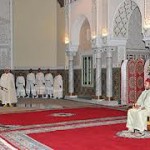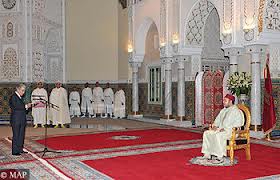ALL AFRICA
Maghreb Arabe Presse (Rabat)
 Casablanca — HM King Mohammed VI received, Thursday in the Royal Palace of Casablanca, Abdellatif Jouahri, Wali of Bank Al-Maghrib, who presented to the Sovereign the central bank’s annual report on economic, monetary and financial situation for the year 2011.
Casablanca — HM King Mohammed VI received, Thursday in the Royal Palace of Casablanca, Abdellatif Jouahri, Wali of Bank Al-Maghrib, who presented to the Sovereign the central bank’s annual report on economic, monetary and financial situation for the year 2011.
In his address before HM the King, Mr. Jouahri said that the national economy achieved broadly positive results in 2011, mainly reflecting strong domestic demand, despite a difficult external situation and a turbulent environment.
He pointed out that the gross domestic product grew by 5%, from 3.6% in 2010, in response to the good performance of the agricultural sector and the noticeable increase in the value added of non-agricultural activities.
Under these activities, Mr. Jouahri said, inflation remained under control, stabilizing at 0.9% notwithstanding the rise in international commodity prices, owing to the continued price-support policy. He also stressed that unemployment rate declined in 2011.
With regard to public finance, the Wali of Bank Al-Maghrib indicated that the marked increase of current expenses negatively impacted fiscal position, as budget deficit reached about 7% of GDP, despite the rise in tax revenues. He pointed to the worsening balance-of-payments current account deficit, which again led to the contraction of foreign exchange reserves.
He went on to say that, broadly, the results of the national economy in 2011 are attributed to the structural reforms undertaken in the last two decades to strengthen the capacity of the national economy to diversify sources of growth, as well as to the prudent macroeconomic management.
However, Mr. Jouahri stressed that the daunting challenges facing the Moroccan economy require accelerated efforts to increase its competitiveness and reduce its dependence on domestic demand. These two factors, he emphasized, would bolster the fundamental internal and external balances and preserve them over the medium term in order for Morocco to maintain its international ratings and its position among the emerging countries.
In this context, he called for accelerating the pace of structural reforms, with priority given to addressing major crosscutting structural rigidities.







